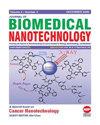油菜素通过调控NF-κB信号级联抑制胃癌细胞进展并诱导凋亡
IF 2.9
4区 医学
Q1 Medicine
引用次数: 0
摘要
胃癌(GC)是最常见的癌症之一,在世界范围内造成大量死亡。油菜素是从十字花科蔬菜中提取的一种植物抗生素,对多种癌症具有重要的抗癌作用。然而,其在GC中的作用和机制尚不清楚。采用细胞计数试剂盒8 (CCK-8)或5-乙基-2′-脱氧尿苷(EdU)法检测油菜素对胃癌细胞增殖的作用。用流式细胞术观察凋亡细胞。引入Transwell分析来评估GC细胞的迁移和侵袭。利用Cignal Finder RTK信号10通路报告器阵列(10-Pathway Reporter Array)确定GC细胞中由花青素调控的下游通路,并用Western blot方法验证。油菜素以浓度依赖性的方式降低GC细胞活力。油菜素抑制了胃癌细胞的迁移和侵袭,诱导了胃癌细胞的凋亡。此外,油菜素灭活了NF- κ B级联信号。同时,NF- κ B激活剂抵消了油菜素对GC细胞进展的影响。本研究指出,油菜素至少部分通过介导NF- κ B通路抑制胃癌细胞生长和诱导凋亡,这表明油菜素将是一种有前景的治疗胃癌的药物。本文章由计算机程序翻译,如有差异,请以英文原文为准。
Brassinin Inhibits Progression and Induces Apoptosis in Gastric Cancer Cells by Regulating NF-κB Signaling Cascade
Gastric cancer (GC) is one of the most frequent cancers, resulting in plenty of death worldwide. Brassinin is a plant antibiotic extracted from cruciferous vegetables and exerts a vital anticancer role in various cancers. Nevertheless, its function and mechanism in GC are still uncovered. The role of brassinin in proliferation in GC cells were tested with cell counting kit 8 (CCK-8) or 5-ethynyl-2′-deoxyuridine (EdU) assay. The apoptotic cells were observed utilizing flow cytometry assay. Transwell analysis was introduced to assess GC cell migration as well as invasion. The downstream pathway regulated via brassinin in GC cells was determined utilizing Cignal Finder RTK signaling 10-Pathway Reporter Array and verified with Western blot assay. Brassinin reduced GC cell viability in a concentrated-dependent way. The brassinin treatment blocked cell migration in addition to invasion, and induced apoptosis in GC cells. Additionally, brassinin administration inactivated the NF- κ B cascade signal. Meanwhile, NF- κ B activator counteracted the effects of brassinin on GC cell progression. This investigation pointed out that brassinin inhibited growth and induced apoptosis at least partly by mediating NF- κ B pathway in GC cells, which indicated that brassinin will be a promising drug for treating GC.
求助全文
通过发布文献求助,成功后即可免费获取论文全文。
去求助
来源期刊
CiteScore
4.30
自引率
17.20%
发文量
145
审稿时长
2.3 months
期刊介绍:
Information not localized

 求助内容:
求助内容: 应助结果提醒方式:
应助结果提醒方式:


